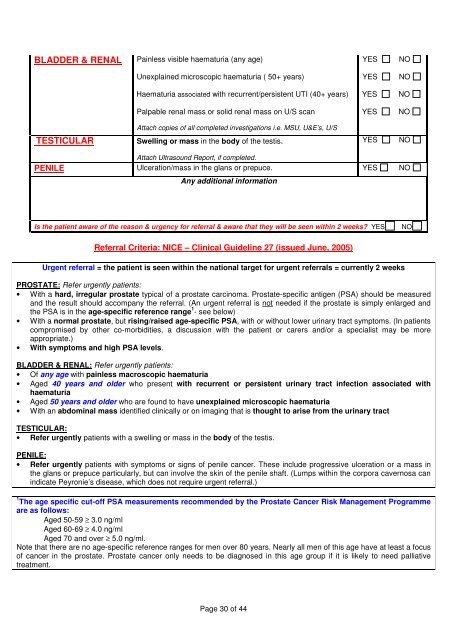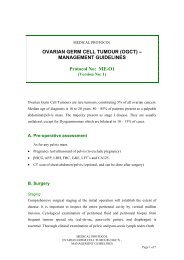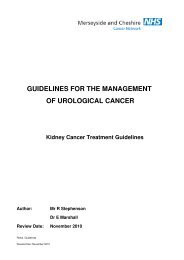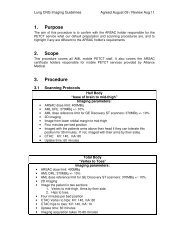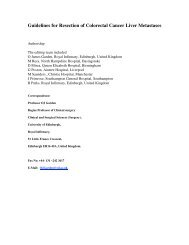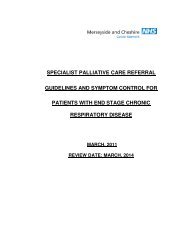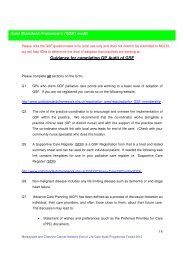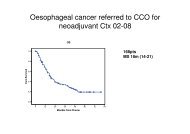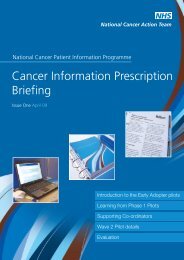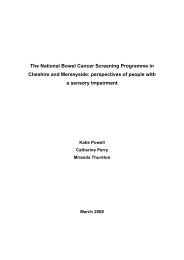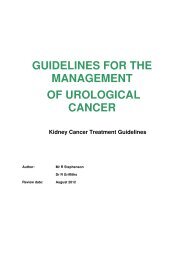guidelines for the management of urological cancer - Merseyside ...
guidelines for the management of urological cancer - Merseyside ...
guidelines for the management of urological cancer - Merseyside ...
You also want an ePaper? Increase the reach of your titles
YUMPU automatically turns print PDFs into web optimized ePapers that Google loves.
BLADDER & RENAL<br />
Painless visible haematuria (any age)<br />
YES<br />
NO<br />
Unexplained microscopic haematuria ( 50+ years)<br />
YES<br />
NO<br />
Haematuria associated with recurrent/persistent UTI (40+ years)<br />
YES<br />
NO<br />
Palpable renal mass or solid renal mass on U/S scan<br />
YES<br />
NO<br />
Attach copies <strong>of</strong> all completed investigations i.e. MSU, U&E’s, U/S<br />
TESTICULAR<br />
Swelling or mass in <strong>the</strong> body <strong>of</strong> <strong>the</strong> testis.<br />
YES<br />
NO<br />
Attach Ultrasound Report, if completed.<br />
PENILE Ulceration/mass in <strong>the</strong> glans or prepuce. YES NO<br />
Any additional in<strong>for</strong>mation<br />
Is <strong>the</strong> patient aware <strong>of</strong> <strong>the</strong> reason & urgency <strong>for</strong> referral & aware that <strong>the</strong>y will be seen within 2 weeks? YES NO<br />
Referral Criteria: NICE – Clinical Guideline 27 (issued June, 2005)<br />
Urgent referral = <strong>the</strong> patient is seen within <strong>the</strong> national target <strong>for</strong> urgent referrals = currently 2 weeks<br />
PROSTATE: Refer urgently patients:<br />
• With a hard, irregular prostate typical <strong>of</strong> a prostate carcinoma. Prostate-specific antigen (PSA) should be measured<br />
and <strong>the</strong> result should accompany <strong>the</strong> referral. (An urgent referral is not needed if <strong>the</strong> prostate is simply enlarged and<br />
<strong>the</strong> PSA is in <strong>the</strong> age-specific reference range 1 - see below)<br />
• With a normal prostate, but rising/raised age-specific PSA, with or without lower urinary tract symptoms. (In patients<br />
compromised by o<strong>the</strong>r co-morbidities, a discussion with <strong>the</strong> patient or carers and/or a specialist may be more<br />
appropriate.)<br />
• With symptoms and high PSA levels.<br />
BLADDER & RENAL: Refer urgently patients:<br />
• Of any age with painless macroscopic haematuria<br />
• Aged 40 years and older who present with recurrent or persistent urinary tract infection associated with<br />
haematuria<br />
• Aged 50 years and older who are found to have unexplained microscopic haematuria<br />
• With an abdominal mass identified clinically or on imaging that is thought to arise from <strong>the</strong> urinary tract<br />
TESTICULAR:<br />
• Refer urgently patients with a swelling or mass in <strong>the</strong> body <strong>of</strong> <strong>the</strong> testis.<br />
PENILE:<br />
• Refer urgently patients with symptoms or signs <strong>of</strong> penile <strong>cancer</strong>. These include progressive ulceration or a mass in<br />
<strong>the</strong> glans or prepuce particularly, but can involve <strong>the</strong> skin <strong>of</strong> <strong>the</strong> penile shaft. (Lumps within <strong>the</strong> corpora cavernosa can<br />
indicate Peyronie’s disease, which does not require urgent referral.)<br />
1 The age specific cut-<strong>of</strong>f PSA measurements recommended by <strong>the</strong> Prostate Cancer Risk Management Programme<br />
are as follows:<br />
Aged 50-59 ≥ 3.0 ng/ml<br />
Aged 60-69 ≥ 4.0 ng/ml<br />
Aged 70 and over ≥ 5.0 ng/ml.<br />
Note that <strong>the</strong>re are no age-specific reference ranges <strong>for</strong> men over 80 years. Nearly all men <strong>of</strong> this age have at least a focus<br />
<strong>of</strong> <strong>cancer</strong> in <strong>the</strong> prostate. Prostate <strong>cancer</strong> only needs to be diagnosed in this age group if it is likely to need palliative<br />
treatment.<br />
Page 30 <strong>of</strong> 44


